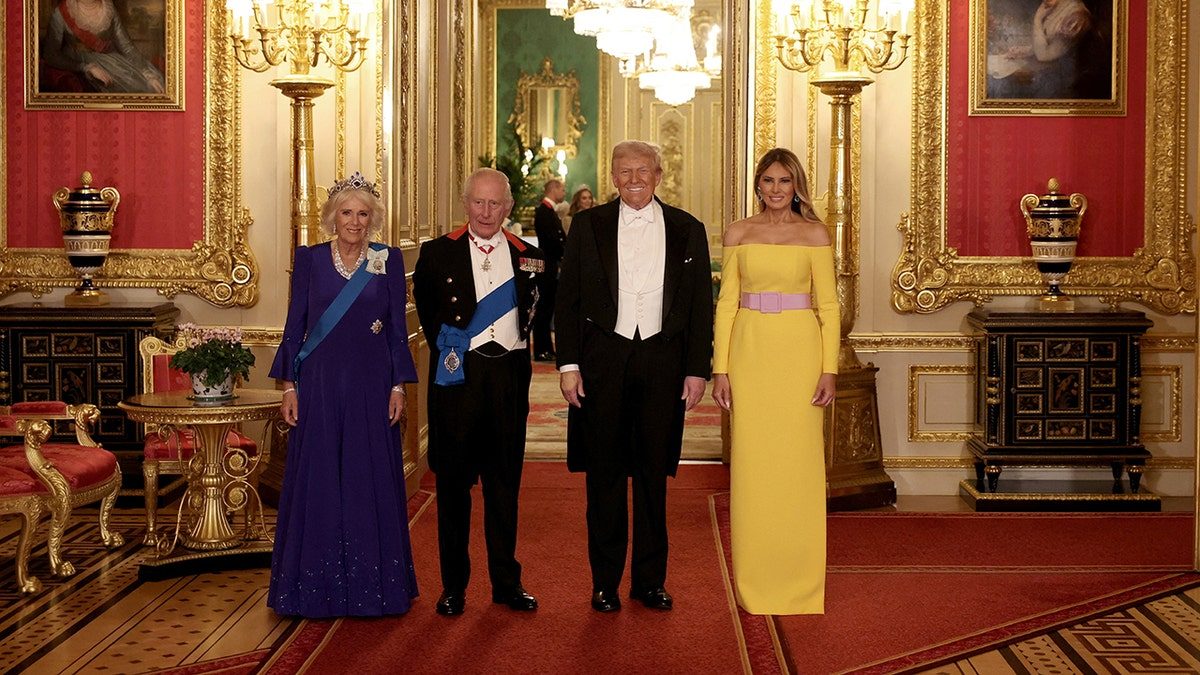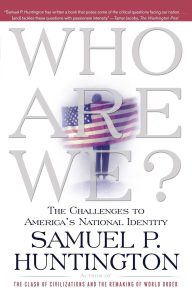 What does it mean to be an American citizen? We are experiencing “a crisis of national identity,” says Professor Samuel P. Huntington of Harvard University. In his book Who Are We?, Huntington notes that traditional American citizenship has Three Pillars: The English Language, Christianity, and British Customs.
What does it mean to be an American citizen? We are experiencing “a crisis of national identity,” says Professor Samuel P. Huntington of Harvard University. In his book Who Are We?, Huntington notes that traditional American citizenship has Three Pillars: The English Language, Christianity, and British Customs.
This four-part series from FPIW examines each — and the perils to them today:
• In Part 1, we focus on the impact of mass immigration as a threat to all Three Pillars.
• In Part 2, we support the First Pillar of the English language.
• In Part 3, we uphold the Second Pillar of Christianity.
• In Part 4, we honor the Third Pillar of our British roots, and then conclude with practical steps to strengthen American Identity.
🇺🇸 🇺🇸 🇺🇸
“If you go for multiculturalism, you will wind up with multi-countries.”
— Patrick J. Buchanan
Americans glimpsed inside the majestic Windsor Castle, as President Donald J. Trump’s state banquet with the British Royal Family made the front-page news. The meeting with the King and Queen renewed a special relationship with the United Kingdom, and it reminds us of our historic bond with England herself, as well as our important heritage with the British culture at large.
During his toast, the King highlighted the “unparalleled partnership” that is “anchored by the deep friendship between our people.” The King continued: “Mr. President, as we appreciate the 250th Anniversary of the Declaration of Independence next year, it is remarkable to think just how far we have come. I cannot help but wonder what our forebearers from 1776 would think of this friendship today.”
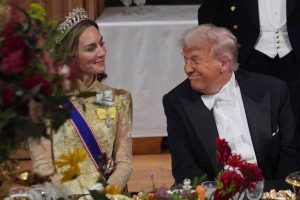 President Trump called the banquet “one of the highest honors of my life,” and the White House emphasized that the bond with Britain is unlike any other in the world: “The United States reaffirms the enduring special relationship with our closest ally, a partnership rooted in shared history, common values, and a commitment to a more prosperous future.”
President Trump called the banquet “one of the highest honors of my life,” and the White House emphasized that the bond with Britain is unlike any other in the world: “The United States reaffirms the enduring special relationship with our closest ally, a partnership rooted in shared history, common values, and a commitment to a more prosperous future.”
For the elite ruling class, that “special bond” may indeed be true today. Yet at the grassroots level of American culture, that bond is in jeopardy, says Samuel Huntington of Harvard University.
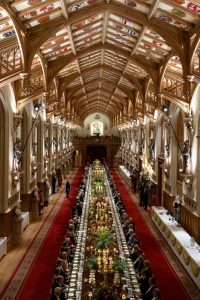 It has, in fact, been decaying for decades.
It has, in fact, been decaying for decades.
Note the shift: For centuries, American unity and identity came “from the ability and willingness of a [British-American] elite to stamp its image on other peoples coming to this country. That elite’s religious and political principles, its customs and social relations, its standards of taste and morality, were for 300 years, America’s,” says historian Benjamin C. Schwarz.
And then two things happened: Multiculturalism emerged with a strong force — both in the form of mass immigration as tidal waves of legal and illegal immigrants poured in, as well as the ideology of multiculturalism being taught in schools.
As a result, British-American culture is currently fractured, frayed, and bifurcated. There is much work to be done to honor and nourish our British heritage as the Third Pillar of American Identity, a heritage that provided a shared social cohesion for centuries in America.
Our first step in doing so is to reject multiculturalism.
I. The Threat of Multiculturalism
Americans need to be reminded of the “truly unique and extraordinary culture which they have inherited from the British,” says William Baer, one of America’s finest writers. The word culture means “what people have, do, and think,” and the history of the United States has been richly influenced by British culture, of that there is no doubt. Yet during the last 50 years, America’s British culture has come under attack by way of two threats:
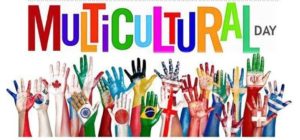 • The first is “outside-in”: Multiculturalism comes by way of mass immigration of more than 70 million immigrants entering into the nation, and a corresponding lack of assimilation, as well as a fundamental lack of a desire to be an American. Bifurcation and enclaves have emerged within the social fabric of American society. (See Part 1.)
• The first is “outside-in”: Multiculturalism comes by way of mass immigration of more than 70 million immigrants entering into the nation, and a corresponding lack of assimilation, as well as a fundamental lack of a desire to be an American. Bifurcation and enclaves have emerged within the social fabric of American society. (See Part 1.)
• The second threat is “inside-out”: It is the ideology of multiculturalism coming from within the nation, which has permeated nearly every curriculum in our schools, and especially at the collegiate level. It aims to “celebrate diversity” and downplay the prominence of our British culture. It has been largely successful as many Americans no longer take pride in being American.
“Diversity and multiculturalism celebrate the national-and-ethnic identities of the nations from where American immigrants came, instead of celebrating the American identity and traditional American values,” explains Dennis Prager. It does not celebrate the Three Pillars of “the English Language, Christianity, and British Customs,” which is the essential core of American Identity.
The subversive force of multiculturalism emerged particularly in the 1970s and continues to this day. It habitually asserts that “Diversity is our greatest strength.” It does not love and cherish British-American culture and seeks to dilute it or attack it directly. It sometimes denounces Western European civilization in protest chants, such as: “Hey hey, ho ho, Western Civ has got to go”. It believes in “the invented myth that all good things came out of Africa and Asia,” reveals the patriotic scholar Russell Kirk. Multiculturalism is driven by hatred and envy for British-American culture, he says.
II. Multiculturalism in Washington State
Multiculturalists want schools not to assimilate students into British-Protestant culture, which includes the ethics of Protestant Christianity, but the exact opposite: transform the schools into places where multiculturalism is upheld and Western Civilization is not. They want multiculturalism to permeate all the curriculum.
The impact of mass immigration cannot be overstated, as explained in Part 1. Overall in Washington State, there are more than 1.2 million foreign-born people, or nearly 1 in 7 residents. (The state has a population of about 8 million in 2025.)
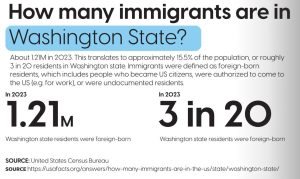
Here is the Governor of Washington praising “Hispanic Heritage Month” with bilingual subtitles (English and Spanish) included:
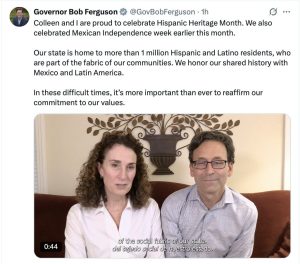
Here is a long list of more than 100 such organizations in Washington State that explicitly advocate for greater multiculturalism. A brief search online demonstrates a sample of them, some of which are taxpayer-funded programs or affiliated “in partnership” with the WA government:
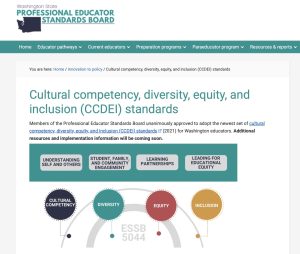
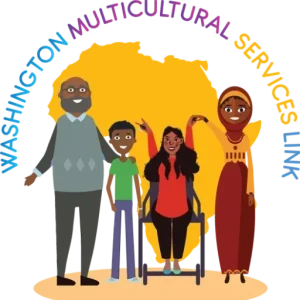


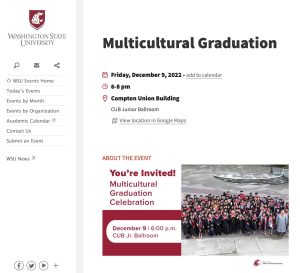

III. The “Great Revolution” That Destroys British-American Culture
Huntington points out that multiculturalism has largely won the day. Students are routinely taught about “the sinful European inheritance” and believe redemption comes from non-Western cultures. The ignorance of American history is striking, as multiculturalism severs our roots. To cite just a few of Huntington’s many examples:
• None of the fifty top American colleges and universities require a course in American history.
• Collegiate seniors are largely ignorant of basic American history facts such as the Civil War (40% did not know when it was fought).
• Only 22% of college students could name the Gettysburg Address as the source of the phrase “government of the people, by the people, for the people.”
These threats to British-American culture — multiculturalism via mass immigration, and multiculturalism via school curriculum — summarize what President Bill Clinton called the coming “great revolution of America”. He said: “This will arguably be the third great revolution … to prove that we literally can live without … having a dominant European culture.” It aims to “de-Britainize” us; that is, to dethrone the British-American culture.
In short, multiculturalism wishes for the US to be like a salad, or a mosaic of sub-cultures, rather than a clearly dominant British culture.
IV. A Summary of British-American Culture
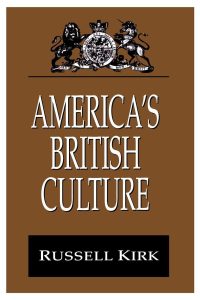 The original bond with British culture was very strong, and it birthed a British-American culture. The British-American culture began in 1607 with the founding of Jamestown in Virginia, and other colonies developed after that, such as Plymouth in Massachusetts in 1620. Eventually, there were 13 British colonies plus other lands.
The original bond with British culture was very strong, and it birthed a British-American culture. The British-American culture began in 1607 with the founding of Jamestown in Virginia, and other colonies developed after that, such as Plymouth in Massachusetts in 1620. Eventually, there were 13 British colonies plus other lands.
America at large was essentially another British colony, another “British outpost,” so to speak, among many around the world.
In fact, in Federalist No. 2, Founding Father John Jay gave thanks to God for six common bonds among Americans. The first bond was a British ancestral heritage: “descended from the same ancestors [i.e., of Europe, especially Britain]”; and the fifth bond referred to “very similar in their manners and customs”.
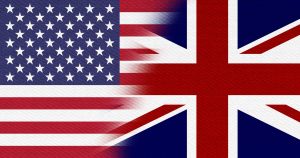 As noted above, such a general bond, in various versions and minor adjustments, lasted for some 300 years. Huntington offers a summary statement of the British-American culture:
As noted above, such a general bond, in various versions and minor adjustments, lasted for some 300 years. Huntington offers a summary statement of the British-American culture:
“Key elements of that culture include: the English language; Christianity; religious commitments; English concepts of the rule of law [e.g., innocent until proven guilty]; the responsibility of rulers, and the rights of individuals; and dissenting Protestant values of individualism, the work ethic, and the belief that humans have the ability and the duty to try and create a heaven on earth, a ‘city on a hill’.”
To unpack and illustrate Huntington’s summary statement above, let’s look at eight specific categories:
• Literature. Like a branch off of a trunk, American literature grew out of English literature, such as poetry, novels, and theater. Shakespeare was revered, for example, along with the King James (of England) Version of the Holy Bible. The book Pilgrim’s Progress was another major influence in America. Modern English authors, such as England’s C. S. Lewis and T. S. Eliot, have had a major impact. Mother Goose rhymes, fairy tales, and English folklore influenced American children’s literature. Idioms such as “It’s raining cats and dogs” come from England.
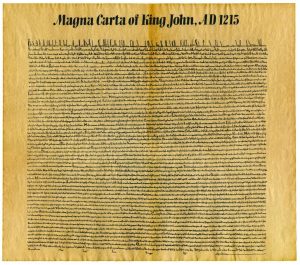 • Government. The US system of a bicameral legislature (Senate and House) comes from England. Kirk points out: “The colonial government all developed representative institutions on the British model.” Huntington notes: “Of central importance in that culture were long-standing English ideas of natural and common law, the limits of government authority, and the rights of Englishmen going back to Magna Carta.”
• Government. The US system of a bicameral legislature (Senate and House) comes from England. Kirk points out: “The colonial government all developed representative institutions on the British model.” Huntington notes: “Of central importance in that culture were long-standing English ideas of natural and common law, the limits of government authority, and the rights of Englishmen going back to Magna Carta.”
• Rights. The English Bill of Rights would be the foundation for the American Bill of Rights, the first ten amendments to the US Constitution. Trial by jury, habeas corpus, and due process come directly from English legal tradition. The king is not above the law, and the Magna Carta expresses the three fundamental and absolute rights of: life, liberty, and property, which are echoed in our Declaration of Independence.
• Laws. William Blackstone’s commentaries on the law (from England) were the prime source of law concepts for Americans. As the historian H. W. Crocker III notes, it was the British who gave or bolstered the American ideals of limited government, an independent judiciary, inalienable rights, and free markets. All fifty states — except for Louisiana, which uses more French and Spanish influences — use the common law from England, e.g., using legal precedents, or stare decisis, i.e., “stand by decided cases”.
 • Protestantism. Various versions of Protestantism came from Europe. One key example is that the Episcopal Church in the US is the descendant from the Anglican Church in England. Out of such Protestantism, Huntington says that among Americans there is a greater clear-cut divide between right and wrong; that each individual can have a direct connection to God and knowledge about Him; that each individual has the responsibility to do good in this world. Young men and women were to be raised to be “self-reliant, hardworking, and morally upright.”
• Protestantism. Various versions of Protestantism came from Europe. One key example is that the Episcopal Church in the US is the descendant from the Anglican Church in England. Out of such Protestantism, Huntington says that among Americans there is a greater clear-cut divide between right and wrong; that each individual can have a direct connection to God and knowledge about Him; that each individual has the responsibility to do good in this world. Young men and women were to be raised to be “self-reliant, hardworking, and morally upright.”
• Holiday influences include the general Christmas celebrations, such as caroling and Christmas pudding.
• Architecture. The styles of colonial homes include English Georgian and Tudor designs, as well as English designs for town common areas.
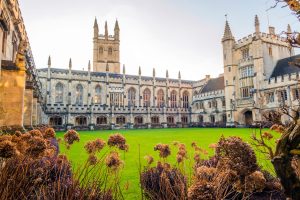 • Higher Education. The Ivy League is modeled after Oxford and Cambridge University and other English universities.
• Higher Education. The Ivy League is modeled after Oxford and Cambridge University and other English universities.
• Sports. American baseball derived from bat-and-ball games such as rounders. American football grew out of rugby and soccer, which were popular English sports.
• Politeness and Manners. The British links to American norms for manners are significant, such as: addressing people by titles in order to show respect (“Mr.,” “Mrs.,” “Sir,” “Madam,” “Lord/Lady”); speaking modestly, avoiding bluntness, and showing restraint were signs of refinement; using phrases such as “please,” “thank you,” “pardon,” and “excuse me”; employing witty, understated humor and indirect speech (“Would you mind…?” rather than “Do this”) were considered marks of civility; controlled posture, not slouching, and careful hand gestures conveyed refinement; and bowing (for men) and curtseying (for women) were common gestures of respect until the 19th century in the US, as GPT Chat outlines.
Today those eight bonds with British customs have been tarnished, as the impact of multiculturalism upon us is profound. But there is hope. Russell Kirk refers to “renewing a shaken culture”:
If America’s British culture is to be reinvigorated, its roots must be watered. … Guardians of that culture must reject such silliness as the multiculturalist ideology, which does nothing more than gratify little ethnic vanities. … If the response to the multiculturalist threat is healthy, it should rouse again among Americans an apprehension of the high merits of the literature, the language, the laws, the political institutions, and the mores [habits] that Americans have received.
V. The Last Great Fight of Our Lives
“Love of an inherited culture has the power to cast out the envy and hatred of that culture’s adversaries.”
— Russell Kirk, America’s British Culture
In this final section, we come to a close of our four-part series on Renewing American Identity. We have suggested to our readers that the essential Three Pillars of American Identity need to be supported and affirmed in today’s body politic of American society: the English Language (“the mouth”); Christianity (“the heart”); and British Customs (“the hands and feet”). Samuel Huntington of Harvard, the author of Who Are We?, encapsulates the concern that we at FPIW share. He writes:
As a patriot, I am deeply concerned about the unity and strength of my country. … Americans should recommit themselves to the [British]-Protestant culture, traditions, and values that for three and a half centuries have been embraced by Americans of all races, ethnicities, and religions and that have been the source of their liberty, unity, power, prosperity, and moral leadership as a force for good in the world.
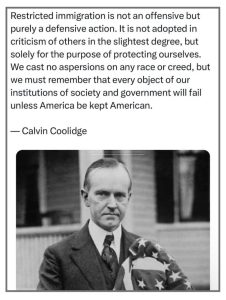 Upholding the Three Pillars of American Identity includes a few basic, practical steps:
Upholding the Three Pillars of American Identity includes a few basic, practical steps:
• Establish English as the official language as a national law or Constitutional Amendment, and in all 50 state governments.
• Seal the borders to protect citizens against illegal immigration.
• Deport millions of illegal immigrants.
• Slow greatly, or halt entirely, all legal immigration for years in order for the Melting Pot (assimilation) to take effect.
• When immigration returns (see above), pass a new law favoring immigration from nations that share an approximation to our common heritage, i.e., the Three Pillars, and thus make assimilation into America easier for immigrants.
• Prioritize Christianity (or at least Judeo-Christian monotheism), rather than Secularism and Islam, in the public square, so that biblical values may flourish.
• Banish multicultural curriculum from schools and begin celebrating British-American culture.
In his book The Death of the West, Patrick J. Buchanan foretold us years ago: “With the collapsing birthrate, open borders, and the triumph of an anti-Western multiculturalism, that is what is at issue today—the survival of America as a nation, separate and unique, and of Western civilization itself—and too many conservatives have gone AWOL in the last great fight of our lives.”
That may have been true for many years. But today differs. Let Patriots arise, and let us be known among those who fought faithfully for our beloved nation as “the last great fight of our lives.”
#####
Additional Resources
Scholarly Quotations About the British-American Bond. In addition to the above research, here are some academic quotations from respected, world-class historians about the strong British bond with America. Samuel Huntington, the author of Who Are We?, cites these:
• Louis B. Wright: “We have inherited the fundamental qualities in our culture from the British.”
• Arthur Schlesinger, Jr.: “The language of the new nation, its laws, its institutions, its political ideas, its literature, its customs, its precepts, its prayers, primarily derived from Britain.”
• Alden T. Vaughan: In early America “almost everything was fundamentally English: the forms of land ownership and cultivation, the systems of government and the basic format of laws and legal procedures, the choices of entertainment and leisure-time pursuits, and innumerable other aspects of colonial life.”
American culture is important to us at FPIW, and we hope you share our sincere passion in defending and advancing Biblical and conservative values in the public square. Join us! Please sign up to become a Defender today, and join us in praying for our elected legislators.

